
*
We caught up with Henry — a previous Tony Award nominee as Best Actor in a Musical for The Scottsboro Boys — to talk about fisherman Jake, one of the more solid citizens of DuBose Heyward's Catfish Row. (Warning: this interview contains some plot spoilers!)
Jake is so different from the other principal men in the show: a positive force in the community. He's employed in something noble — he's a fisherman — and he's a dad and he clearly loves his wife, Clara. In a world where there are gamblers, a disabled beggar, a drug dealer and a drug addict, Jake seems to represent something.
Joshua Henry: I think he's kind of the new life…of Catfish Row. I don't think many people — any — from this community have gone on to [better things]. Most of them were born and died in Catfish Row. His plan — the reason he's so focused on work — is because he's going to get his kid through college. For me, Jake is definitely that flicker of light in that community. He wants to do more with his life — he wants his kids to go further. I recently got engaged, and, you know, in a couple of years, I’ll be thinking about kids, hopefully. So, it's great to be able to play that role right now because it's so family-oriented and focused on working hard and thinking about the future; that's what I want to be.
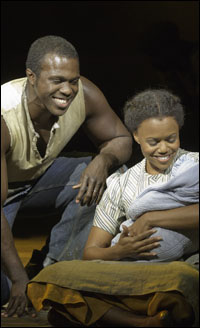 |
||
| Henry and Nikki Renée Daniels in The Gershwins' Porgy and Bess. |
||
| photo by Michael J. Lutch |
JH: There are a lot of times [in Suzan-Lori Parks' new adaptation of the musical] where we see that Clara and Jake are kissing — there are little clues here and there that just show that they're so, so in love. In preparing for the show, you focused on the newly adapted script, not the 1935 Broadway script, right?
JH: That is correct. But, I did get a chance to read the play Porgy, on which the piece is based, and it's similar. I didn't see an [opera] script from 1935 or '36, but I did read the play, and so, a lot of the decisions I made were based on just fleshing that out a bit more.
Did you read the novel, "Porgy," too?
JH: I did.
Is the novel a similar tone?
JH: It is darker. Jake is in there; they refer to him as a "good-natured Negro." [Laughs.] In both the novel and the play, that is definitely his character, so that was just something that was built upon in this production. That was definitely there as a base.
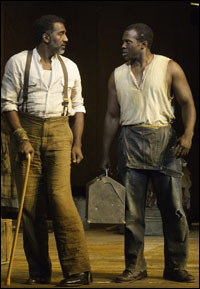 |
||
| Henry (right) and Norm Lewis |
||
| Photo by Michael J. Lutch |
JH: My audition process was very unique in that I went in one time, and then like three months later, I went in for another different character — I went in for Crown, Porgy, and then I auditioned for Jake. I kind of knew after I did the sides and sang the songs that I got it — just had one of those feelings. And, they were both just looking at me like I was Jake. They were saying, "I just want you to know that this character is the life. The community lives through Jake and Clara. They are definitely the hope." That's what it is — "the hope of Catfish Row." We know that there were other children in this community, but in our production [their baby] is the only child that we see on stage. They were just adamant about [us] knowing that "you are the hope, you are the light of this community." Exploring the script a little bit more, we were seeing that this kind of made sense: Jake is the one who is always sticking up for people or is always trying to break up a fight. I admire the character so much. He is dedicated to his family. He is dedicated to his community.
He's a very successful person in terms of he's got his own [fishing boat]. That's a really big deal at that time. Probably, he and Sporting Life, I would say, are probably the most successful people that are in that community. Porgy's the beggar, you know, and everyone else has got their humble lifestyle. He's a humble guy as well, but he's got this job and he has three people from the community on this ship, so he's just an all-around great guy. [Laughs.]
In terms of song assignment, you get something pretty special at the top of the show.
JH: Oh, wow. Yeah.
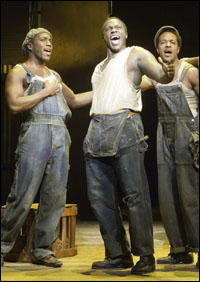 |
||
| Wilkie Ferguson, Joshua Henry and Trevon Davis |
||
| photo by Michael J. Lutch |
JH: That is correct. Diane talked to me and Nikki Renée Daniels about the fact that she sings about "your daddy being rich," and [laughs] she thought it would be all that much more heartbreaking when the family — this loving family, the hope of Catfish Row — splits up for whatever reason. I think it does [add pathos], having Jake sing at the top. So, we automatically get a loving family, the hope, the future — these very gentle, humble beginnings. And then we get slammed into this world. Can this family survive in this world that is striving, has been pulled apart by death and the storm and all these different things? And then, I think what's interesting, is we track the baby after they're gone. Bess, then, has the baby. Someone who was an outsider, at first — was shunned — now she's got the hope, and what's she going to do with it?
I totally tracked that: The audience is so invested in that basketful of child.
JH: Yeah. "Summertime" now feels like more than a sentimental Southern song that conjures mood or place. It becomes a great projection about what they can be. It now has the feel of "Wheels of a Dream" from Ragtime, doesn't it?
JH: It absolutely is. It is absolutely "Wheels of a Dream!" [Laughs.]
You also lead the songs "A Woman Is a Sometime Thing" and "It Takes a Long Pull." Were there major changes for you or for your track between the America Repertory Theatre tryout last summer and Broadway, or did it mostly remain the same?
JH: "A Woman is a Sometime Thing" at A.R.T. wasn't as big of a production number as it is now, so they kind of fleshed it out. There's a little dance section now — I think it is great to see the women versus the men; that didn't happen in Boston. Also, some of the arrangements are slightly different. It has seemed to have been fleshed out a lot more, Jake's track — especially when it has to do with Clara. Even if they're not saying anything, you see Jake and Clara, you know, always together side-by-side. I think it's a great choice.
Read about the new two-disc Broadway cast album of Porgy and Bess.
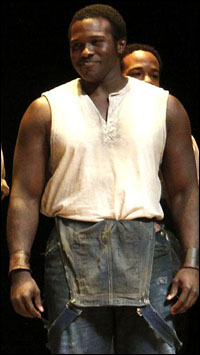 |
||
| Henry on opening night |
||
| Photo by Joseph Marzullo/WENN |
JH: We did, both for the dialects and just the movement. Ronald K. Brown, the choreographer, he gave us a lot of tips and clues on how to research the Gullah people, as they're called, from this particular area in South Carolina, and we learned so much. When we did the workshop, we had to slam right into movement and dialect and all this stuff, so we didn't really know exactly what we were doing until we got that little bit of the research. And, the movements, especially, that Ron K. gave us are so authentic to what was going on — or to the movements of that time. And, I got a lot better understanding in researching it more — the Gullah people — and how accurate Gershwin got it. The sounds of that time. There's the honey man, the strawberry woman. You know, people in the community that had these jobs. When they would go around the streets, they would sing, "Here comes the honey man. Honey man. Honey man!" or "Strawberry woman. Strawberry woman!" George Gershwin, who was Jewish, in his 30s, really tried to get to the bottom of this [world], to get this period of these people as authentic as he could. He did a really great job capturing that sound.
You grew up and went to school in Florida.
JH: That's true. I went to the University of Miami.
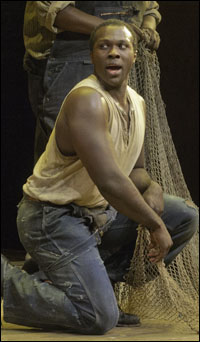 |
||
| Henry in The Gershwins' Porgy and Bess. |
||
| photo by Michael J. Lutch |
JH: Oh, my goodness. That was actually a very big deal for me because I know all about the hurricanes. I mean, hurricane season is just a regular thing, so when we are going through this hurricane — this storm [in the show] — sometimes I would think to myself, "Some people had never been through a hurricane." And so we got to talking about it, and it's life and death. There's nowhere to go. You can't go outside. Being in the bands of a hurricane, it's not like a tornado that's going to pass very quickly. It's the most serious thing that you will ever experience next to, I'm sure, an earthquake —
When I saw Porgy and Bess, and the storm strands the characters, I was reminded that hurricanes can last five or six hours. If you can't flee inland, you're trapped!
JH: Yeah. Yeah. You literally just have to wait it out. I remember being in my house from when I was like five to when I was like 12. When hurricanes would happen, you just hold hands and you say, "You know what, we have each other. We're praying," and this roof can literally peel off of your house. And so, it's one of those moments, it's like the people around you are so close, and you're like, "This can be it. This really could be it." [Laughs.]
You talked to the cast about that?
JH: I did — and also the fact that sometimes you'll have seven hurricanes in a season, and you never know which one can go to a Category Four. These people in this area, in Charleston, they didn't know how strong it's going to be, so when that hurricane bell sounds, everything shuts down. And, going back to Clara, she actually goes out to find Jake in the storm, which is instant suicide. It just says to me: the love that she has [is so strong]! Every time I watch that scene, it crushes me. Read Playbill.com's 2010 The Leading Men column, in which Henry talks about his experience with The Scottsboro Boys.
(Kenneth Jones is managing editor of Playbill.com. Follow him on Twitter @PlaybillKenneth.)










